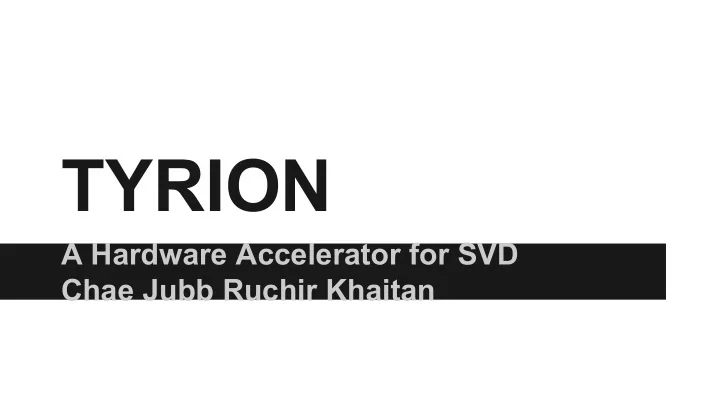

TYRION A Hardware Accelerator for SVD Chae Jubb Ruchir Khaitan
A Singularly Valuable Decomposition ● Do you remember linear algebra? Neither do we ● SVD allows you to decompose a matrix A into its singular values and left and right singular vectors
What is it good for? ● Can make a low rank approximation A’ using only the first k singular values ● Has uses in machine learning, natural language processing, image compression, seismic tomography analysis, etc
Image Compression ● Original (square) image requires n 2 storage space ● Using only k singular values requires (2n + k)k space ● Relatively small k provides good approximation
Example k = 64 k = 128 k = 512
2-Sided Jacobi Algorithm ● Basic idea: we want a diagonal matrix, so we want all of the off-diagonal elements to be zero ● Multiply matrix A with 2x2 rotation matrix to make off-diagonal element at index i,j go away ● Keep doing that, and collect the rotation matrices into the left & right singular vectors
Algorithm Pros and Cons: ● Easily parallelizable ● Rotation matrices since each “elimination” require trig functions depends only on that ● Trig functions mean we row and column can’t use integer data ● Converges in quadratic types time ● Requires conversion to ● An implementation fixed point existed online ● Online implementation wasn’t super great
SystemC ● System level modeling provides a higher level of abstraction (think in terms of threads and logical transactions not digital circuits) ● Generates correct and fast Verilog ● Novel toolchain
Architecture ● Defined a high level wrapper over the hardware (between the driver and actual hardware) ● Send data to/from hardware with buffered FIFOs (one 32 bit chunk at a time) ● Communication with device done with 4-way handshake
Interface ● You put a matrix in (either one 32 bit integer at a time or memory mapped) and you get 3 matrices out. ● Doubles are convert to 64 bit fixed point numbers (40 bit fractional part)
Testing ● Fully randomized testbench ● SystemC provides full simulation environment ● Cargo CAD tools
DEMO!
Challenges ● Setting up toolchain ● Dealing with communication between different Avalon protocols ● Bus woes
Lessons Learned ● Ruchir: Hardware is hard whereas software is fun. Also, having good partners makes everything much better. Also, 620 CEPSR is a great room. ● Chae: Mixing toolchains is hard. Mixing IPs is hard. Mixing semantics is hard. Writing code is easy.
Recommend
More recommend